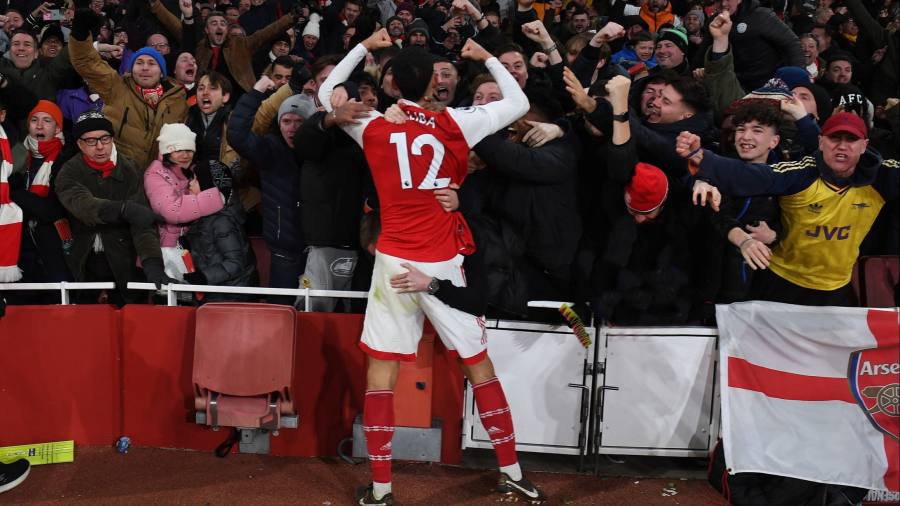The club is called Arsenal. To put the definite article before its name was natural enough a couple of generations ago. Now, to me, it can sound affected: a case of “fakelore”. Yet, in the iconography around the stadium, in the commercial branding, the club increasingly goes with “the Arsenal”. There are also more references to “north London” than when I was going as a teenager in the 1990s. The new prematch song is localist in its sentiments (“these streets are our own”). Adidas brings out a line of vintage-themed merchandise with larcenous frequency.
What explains the ongoing clout of the Premier League? It is Europe’s best, but not by a margin that is commensurate with its world appeal. It has provided two of the last 10 Champions League winners. Its internal competitiveness is also overstated. Manchester City have won it four times out of the last five. And still foreign tycoons, even sovereigns, vie to own clubs here. Foreign viewers tune in. The result is financial mega-strength: what the president of Spain’s top league calls a “doped market”. Chelsea alone spent more on transfers in the winter window than the other big leagues of Europe combined.
The answer, or part of it, is all that tradition and identity. The fan culture. The stadiums in the midst of residential streets. The towns with few other defining institutions. (Unlike, say, in Germany, where wealth and culture are more dispersed through the regions.) Note how often foreign buyers skip London, which is too big to leave a mark on, for clubs in the north or midlands. And how often they then imprint themselves on those communities. Thai-owned Leicester and Gulf-owned City stand out as case studies. The Premier League sells to the outside world a kind of vicarious belonging. It sells authenticity.
And, in the process, depletes it. Will the world still be so beguiled when the league feels like it could be anywhere? There is a cycle here: a distinctive culture hooks the outside world, which buys into it, which erodes that distinctiveness, which in turn bores the world. It is the dilemma that faces the UK’s grandest private schools. Parents from Peru to Japan send their children to Harrow and the rest because they sense something pukka, something uniquely English, there. By definition, though, doesn’t that stop being true once the international share of the intake crosses a certain point? Or when offshore campuses spring up in too many places? To retain the world’s interest, these institutions can’t be too open to it.
This is the one threat to the Premier League. It is hard to see another. Experts have predicted eight of its last zero recessions. Clubs have hardly begun to monetise much of the foreign audience. The pandemic, which was supposed to end the gold rush, didn’t.
But a loss of local identity could. The world likes the Premier League in part because it is so alien. The best argument against all-star games, super leagues and other imported reforms is not moral or aesthetic, but strategic. There is no value in the quick earner if it reduces fascination with the league over time. Manchester United could sell the naming rights to their stadium, but the storied “Old Trafford” is worth more to the commercial brand in the round. “Long-term greed,” I believe is the Goldman Sachs phrase.
The French statesman Mirabeau is meant to have said that Prussia was not a state with an army, but an army with a state. England, from outside, can seem like a football league with a nation. It has a claim to be our number-one soft-power asset. The “EPL” is the subject a stranger is likeliest to raise with me upon hearing my accent in the US (where “Premier” rhymes with “Vermeer”). I’ve seen a bar showing West Ham at 2am somewhere around Sukhumvit Soi 12 in Bangkok. No great shock, until I tell you that it was a repeat from the 1993-94 season.
I cherish all this about the league: the last empire Britain has on which the sun never sets. But to remain global, it must cling to the local. The song, the artwork, “the” Arsenal: it can be a tad studied. But much of the intended audience is continents away.
Email Janan at janan.ganesh@ft.com
Find out about our latest stories first — follow @ftweekend on Twitter
Credit: Source link














